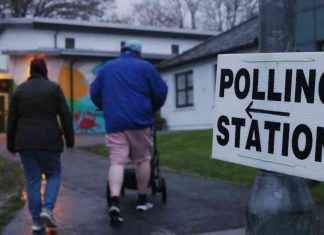The state’s new consultant for the Interstate 77 toll lanes project will study ways the controversial contract could be changed, including multi-use discounts for frequent commuters and possibly converting some of the toll lanes to free ones.
Democratic Gov. Roy Cooper’s Department of Transportation has hired Philadelphia-based Mercator Advisors to study possible improvements to the contract with I-77 Mobility Partners, a subsidiary of Cintra.
Any changes could cost the state tens or hundreds of millions of dollars, and it’s unclear whether the DOT will move forward with any of the modifications.
But for now, Mercator will study the impact of terminating the 50-year agreement with Cintra, changing the $655 million contract, or buying the toll lanes entirely and the right to collect toll revenue.
Jim Taylor of Mercator said there is precedent nationwide where highway departments have either altered toll lane or toll road contracts or bought out the private developers entirely.
“Just because you sign a contract doesn’t mean you give up,” Taylor said Wednesday night at a meeting of regional transportation planners.
Beau Memory of the N.C. Turnpike Authority – a branch of the state DOT – said the state would take a close look at all options.
“We come here with fresh eyes,” he said.
Many north Mecklenburg residents have lambasted the toll lanes as unfair. Others are upset that the project isn’t adding any extra free lane capacity to I-77 and that all of the expansion is with new express toll lanes.
Cintra is building two express toll lanes in each direction between uptown Charlotte and Exit 28 in Cornelius. Between Cornelius and Exit 36 in Mooresville, there will be one express lane added in each direction.
One possibility is to turn the new express toll lane between Exit 28 and Exit 36 into a free general purpose lane. Lake Norman commuters would still have a guaranteed travel time for 18 miles of their journey, and people who don’t want to pay tolls would still get some traffic relief – especially over the causeway that bisects the lake.
Taylor said Mercator will study that option.
“We have seen things about the northern segment being free, and you could still capture the commuters coming in,” he said.
If the state decides to purse that option, the DOT and Cintra would have to decide how much Cintra should be compensated for its lost revenue. Taylor said Mercator will give the DOT a range of the possible penalties for changing the contract.
In addition to money, the changes could also impact the construction schedule. The toll lanes aren’t being built to handle truck traffic since they will only be available to cars. That means Cintra and the DOT might have to spend more money to improve the quality of toll lanes converted to free lanes.
Taylor said a number of projects nationwide have been modified or scrapped, including a planned $1.4 billion toll road in Virginia, U.S. 460.
But he said the I-77 project is unique in that the N.C. DOT has put little money so far into the project. The state has spent about $90 million so far on the project, and could pay Cintra another $75 million if its toll revenue projections fall short.
“I think that this is a unique situation,” Taylor said. “I’m not aware of a direct example where you had so little money and you advanced on a P3 (public-private-partnership) like this.”
Taylor said another option are subsidies for low-income drivers or people who commute daily.
Kurt Naas, a Cornelius resident who opposes the project, said Cintra will seek hundreds of millions of dollars from the DOT for any changes to the contract.
“Based on Cintra’s (overly optimistic) revenue projections, the total penalty would easily run into hundreds of millions,” Naas said in an email. “So the only proper way out of this is to do the right thing, which is cancel the contract and complete the Lake Norman bottleneck with general purpose lanes.”
When the DOT announced in early April that Mercator would review the toll lanes project, some questioned the relationship because Mercator had worked with Cintra in 2004 on a Texas project.
Taylor told the Charlotte Regional Transportation Planning Organization Wednesday that was a small contract more than a decade ago – and before he arrived at the company.
“We have no interest in anything pending,” Taylor said.
[READ MORE: Is the independent I-77 toll lane review really independent? Some residents say no]
When the toll lanes were debated last year, former Gov. Pat McCrory’s DOT took an all-or-nothing approach with local transportation officials who were deciding the fate of the project. The state didn’t suggest to local officials the contract could be tweaked.
During the gubernatorial election, Cooper said he opposed the toll lane contract, though he didn’t say he would cancel it. Some credit thousands of Republican voters in north Mecklenburg for being the difference in the election when they close Cooper over McCrory.
Steve Harrison: 704-358-5160, @Sharrison_Obs
Our editors found this article on this site using Google and regenerated it for our readers.





